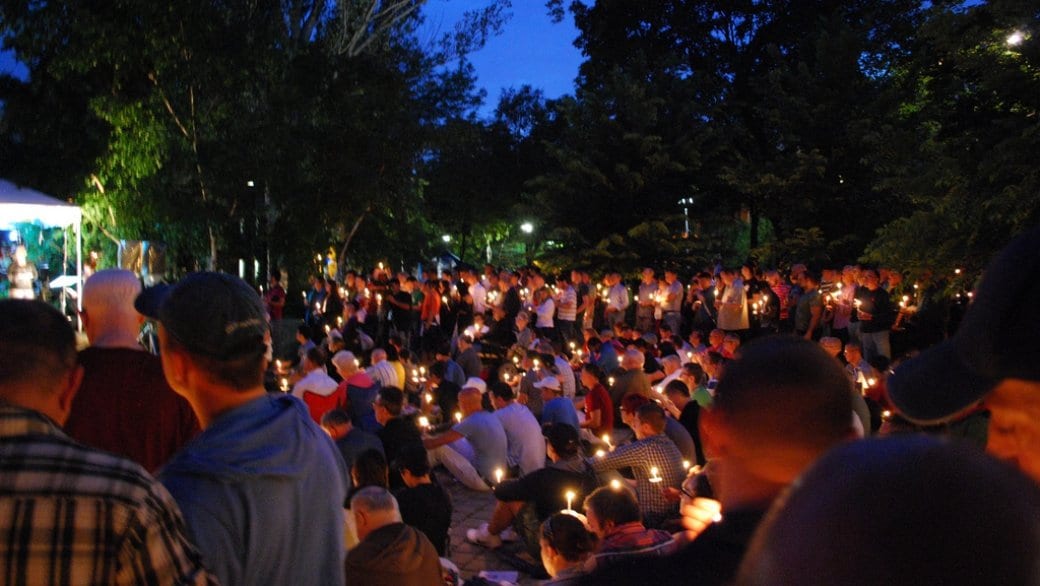On June 28, 2016, in Toronto, the AIDS Candlelight Vigil honoured, remembered and celebrated those who lost their lives to one of the deadliest plagues in history, where about 34 million people died of AIDS. Fourteen names were added to the the AIDS Memorial in Barbara Hall Park on the day as well — five of whom had passed this year. I listened to hosts, Precious Maseko and Robin Rhodes, introduce the program for the evening, while the sun set. I was standing next to my friends, and my lover behind me with his hand in my back pocket. In that moment I wondered whether one day there would be no names to add because we would finally find a cure or vaccine. Sometimes it feels like we’re so close, yet other times it feels like a pipe dream.
There were many songs performed that evening, somewhat somber, with couples embracing and slowly swaying with all due respect: “Still I Rise,” “Don’t Forget Me,” and “You’ve Got a Friend,” were some of the songs sung by people in different languages, of different races, ethnicities and sexualities. In a world that’s growing more divided, it was hopeful to see different people come together like that. It gave me hope that we can beat HIV.
In between the music, the hosts talked about where we are and how we got here, which made me think: where exactly we are in this fight against HIV? With antiretroviral drugs, people who are HIV-positive can reduce their viral load to undetectable levels and lower the risk of transmitting HIV to others significantly. The treatment becomes a method of HIV prevention called TasP (treatment as prevention). Yet still we find folks self sero-sorting, perpetuating stigma associated with HIV. Then we have PrEP, which was approved in Canada this year — a huge feat. It protects one against HIV by 99 percent, yet we still have people like Michael Weinstein, the CEO of the AIDS Healthcare Foundation, who claims that it’s nothing more than a “party drug.”
Regardless of what some might think of these innovations, we got here because our brave sisters and brothers who understood that action = life, ignorance = fear, and silence = death. We learned not to be silent, and only then did they start to listening to us.
“Activists got us these drugs, but once we got them we stopped fighting and returned to partying,” wrote Larry Kramer last month in Esquire. “We stopped celebrating the glory of our greatest achievement too soon to get back to where we left off when we started dying like flies.”
Though his assessment may seem somewhat harsh, there’s a lot of truth in what he’s saying. Silence = death, and as a community we’ve become much more quiet. In 2014, there were still an estimated 16,020 people in Canada who were living with undiagnosed HIV, and 2,570 new HIV infections. Why aren’t we all fighting to fix this? In the US, there are a staggering 50,000 new infections per year, and in 2012, 13,712 people with an AIDS diagnosis died. Why aren’t we all fighting to fix this either? HIV is still a serious problem and we have serious solutions like TasP and PrEP. But many people are still ignorant about them, creating stigmas, fear and misconceptions which only perpetuate these troubling stats.
I’m starting to believe that the only thing worse than silence is apathy. We should care that in Canada, with exception to Quebec’s drug program, PrEP is inaccessible for most people (unless you have private insurance, and still that’s only if they’ll cover it, or if you’re a part of a clinical trial) and therefore useless to those who are most at risk. We should care that the only thing standing between the problem and the solution is the greed of Gilead Sciences, the manufacturers of Truvada. Their total revenues in 2015 were $8.2 billion, with a net income of $4.5 billion, up $1.7 billion from 2014 — we should be furious about this.
At the vigil, people began lighting the individual candles from the larger one at the front. The park flooded with candlelight, on our faces, and in the branches above. I watched the light slowly move through the park. They read the names of those were added to the AIDS Memorial this year: Anis S, Gerald Michael Rowlin, Dr Ronald Ince, Bob Murray, Billy Rogers, Ian Dubourdieu, Jason Ryan Pitre, James Francis Ayerst, Jamie Foster, Mathew Ronald Wilson, Jason Andrew MacArthur, Gordon J Grolway (Gordie), Todd Alexander Glanville and Phillip James.
To my left was a man in his mid-50s with a younger fellow, who embraced him, head buried between shoulder and chin. When they asked people to call out the names of lost loved ones, the older man shouted three names in a row. His friend held him tighter and began rubbing his back. He then called out a fourth name. A moment later he shouted a fifth, his voice cracking.
It’s true that we’ve come a long way since the tragedies that our community had endured, particularly in the ’80s and ’90s. The police had raided our bars and bathhouses, and governments ignored us and let us die but there was no way they could shut us up. We’ve achieved so much, medically, but rather than being complacent with where we are, we need to fully understand where we need to get to, and keep fighting because we need to get to zero.

 Why you can trust Xtra
Why you can trust Xtra


